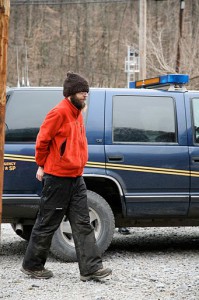 Last week, Eric Blevins came down from a nine day tree-sit on Coal River Mountain. He then spent a couple of days in jail. While in jail, he wrote this letter to the Register-Herald in Beckley, WV and then dictated it over the phone to a support person at Climate Ground Zero.
Last week, Eric Blevins came down from a nine day tree-sit on Coal River Mountain. He then spent a couple of days in jail. While in jail, he wrote this letter to the Register-Herald in Beckley, WV and then dictated it over the phone to a support person at Climate Ground Zero.
This week, we commemorated the 50 year anniversary of the Greensboro sit-ins that were an integral part of the civil disobedience phase of the civil rights movement. Many of the students that participated in those sit-ins were trained at the Highlander School in Tennessee near Coal River Mountain tree-sitter Eric Blevin’s home.
As we ponder our next steps in the climate action and climate justice movements, we need to remember that this sort of large scale change requires sacrifice. With sacrifice, we need support. The civil rights activists risked their lives fighting segregation in the south. Many spent long periods of time in jail. During the Greensboro sit-ins, violence and harassment of protesters often escalated.
So far, the coal industry and their political allies, inside and out of Appalachia, are fighting the anti-mountaintop removal legally (both criminal and civil), often resulting in jail time and fines. There have also been threats and acts of violence directed at community members, organizers and activists in the coalfields. Eric and his fellow tree-sitters sat in 60 ft. trees for over a week while coal company employees harassed and abused them with constant noise, bright lights, tree shaking and threats of spraying them down with fire hoses. At the end of their tree-sit, Massey Energy has sued them for $75,000 and filed for a temporary restraining order in federal court.
To me, there are a number of obvious parallels to the Greensboro sit-ins and the Coal River tree-sits. Like our predecessors in the civil rights movement, the anti-mountaintop removal movement has drawn a line in the sand to end the “pervasive and irreversible impacts” of mountaintop removal and can’t give up.
Here’s Eric’s letter from a jail in southern West Virginia:
This is in response to the article in Saturday’s paper about Amber and I coming down from our tree sit and the letter about paid, outsider environmentalists who support the EPA, which I read while sitting in the Southern Regional Jail.
I am not an outsider. I am an Appalachian. Virginia-based Massey Energy is an outsider. The people who live in the mountains and work on the mine sites work harder, longer hours and make less money than those who work at Massey’s headquarters in Richmond. All the people here should control how the land around them is used and they should profit the most from it, not people in an office far away who aren’t as impacted by the decisions they make that destroy our mountains.
I and most activists I know are not paid. We are volunteers. Groups like Mountain Justice and Climate Ground Zero help raise funds for legal fees and action supplies, but don’t pay people. Their money is donated by people who support the abolishment of mountaintop removal. They have budgets of just a few thousand dollars each. Massey has billions of dollars. They recently laid off workers and raised CEO Don Blankenship’s salary.
I and most activists I know do not support the EPA. They are not doing enough to stop the destruction of our mountains. While they review permits, the explosions are still going off in our home every day.
I climbed a tree to defend God’s beautiful divine creations: the people who live below the Brushy Fork sludge impoundment being threatened with imminent death by the blasting, the plants and animals being slaughtered, Coal River Mountain, our air and our water. The actions of my friends and I were nonviolent and defensive. Massey’s actions are violent and offensive. They blasted air horns and sirens at us in the trees almost nonstop for days on end. They have said that 998 people will die if the dam there fails, yet they set off explosives near it. It is an unlined earthen dam and those fail, like the one operated by TVA near my home in Tennessee that spilled 1.6 billion gallons of coal waste just over a year ago, practically destroying an entire community. Brush Fork holds back over 7 billion gallons, for now. It may not hold it back much longer if we don’t stop the blasting.
Eric Blevins